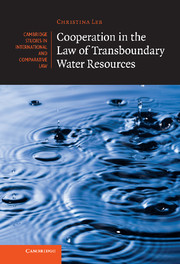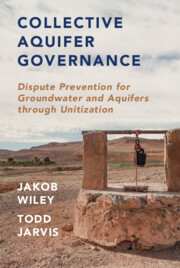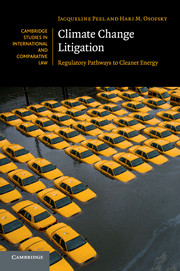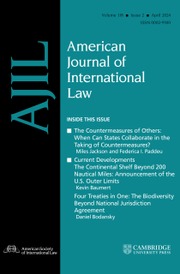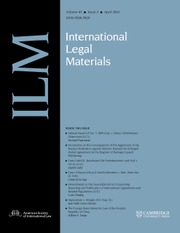Cooperation in the Law of Transboundary Water Resources
£110.00
Part of Cambridge Studies in International and Comparative Law
- Author: Christina Leb, Université de Genève
- Date Published: July 2013
- availability: Available
- format: Hardback
- isbn: 9781107035973
£
110.00
Hardback
Other available formats:
Paperback, eBook
Looking for an inspection copy?
This title is not currently available on inspection
-
Climate change, population growth and the increasing demand for water are all capable of leading to disputes over transboundary water systems. Dealing with these challenges will require the enhancing of adaptive capacity, the improving of the quality of water-resources management and a reduction in the risk of conflict between riparian states. Such changes can only be brought about through significant international cooperation. Christina Leb's analysis of the duty to cooperate and the related rights and obligations highlights the interlinkages between this duty and the principles of equitable and reasonable utilisation and the prevention of transboundary harm. In doing so, she considers the law applicable to both international watercourses and transboundary aquifers, and explores the complementarities and interaction between the rules of international water law and the related obligations of climate change and human rights law.
Read more- Challenges the traditional conceptualisation of 'transboundary water resources' in international water law and extends the legal analysis to global hydrologic interdependence
- Analyses the existence of international cooperation obligations in human rights law, as well as the interactions between this area of law and international water law
- Analyses complementarities and interactions between different areas of international law, thereby illustrating the interconnectedness of the different areas and underlining the importance of systemic analysis
Awards
- Winner of the 2014 Professor Walther Hug Preis
Reviews & endorsements
'Readers will find the final section of Leb's study, addressed to the emerging challenges for transboundary water management, a valuable reflection on the way transboundary water law is increasingly influenced by the evolution of international human rights law and global hydrological threats associated with climate change.' Steve Mumme, The Journal of Water Law
Customer reviews
Not yet reviewed
Be the first to review
Review was not posted due to profanity
×Product details
- Date Published: July 2013
- format: Hardback
- isbn: 9781107035973
- length: 366 pages
- dimensions: 229 x 152 x 21 mm
- weight: 0.65kg
- contains: 2 tables
- availability: Available
Table of Contents
Introduction
Part I. Acknowledging Interdependence:
1. Cooperation between sovereign states
2. Development of international water law
Part II. A General Duty to Cooperate: What Does it Mean?:
3. The duty to cooperate and concurrence of principles
4. Informing cooperation
5. Adoption of joint measures
Part III. Dealing with Evolving Challenges:
6. International protection of vital human water needs
7. Emerging international cooperation on global water challenges
8. Conclusion
Annex: consideration of cooperation in international treaties.
Sorry, this resource is locked
Please register or sign in to request access. If you are having problems accessing these resources please email [email protected]
Register Sign in» Proceed
You are now leaving the Cambridge University Press website. Your eBook purchase and download will be completed by our partner www.ebooks.com. Please see the permission section of the www.ebooks.com catalogue page for details of the print & copy limits on our eBooks.
Continue ×Are you sure you want to delete your account?
This cannot be undone.
Thank you for your feedback which will help us improve our service.
If you requested a response, we will make sure to get back to you shortly.
×
